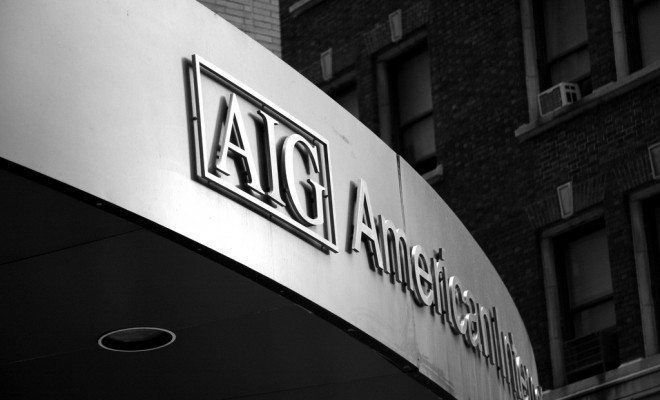 Image courtesy of [Alex via Flickr]
Image courtesy of [Alex via Flickr]
Law
Court Ruling May Stop Future Bank Bailouts
After the federal government bailed out insurance giant American International Group (AIG), the company’s former CEO Maurice “Hank” Greenberg expressed his gratitude by suing the United States. In 2008 the government lent AIG $85 billion in return for a 79.9 percent stake in the company, which Greenberg claimed was an illegal taking of property from shareholders. Although the court ruled in Greenberg’s favor, it decided not to award the $40 billion in damages that he wanted. This decision, which both sides will likely appeal, could discourage the government from engaging in future bailouts, as such a move could be deemed illegal.
In his ruling, Judge Thomas Wheeler stated that the Fed had crossed the legal line in demanding an equity stake in the company; however, he did not believe that AIG’s shareholders had been damaged by the move. Since the company would have gone bankrupt without government funding, he did not award damages. According to Wheeler, “20 percent of something [is] better than 100 percent of nothing.”
While Wheeler acknowledged the positive effects of the bailout, he also argued that the government should not have taken such a large portion of the company’s ownership. But without that requirement, the government may not have been confident enough to give billions of dollars to a company that was failing due to risky business practices. The ruling could create a precedent that discourages the government from dealing with future financial crises. Many Americans are upset by Greenberg’s victory, especially because the taxpayer-financed bailout clearly saved AIG.
AIG and several other companies were involved in the sale of credit default swaps, but as the value of its mortgage-backed securities fell, its credit was downgraded because it could not provide adequate collateral to back outstanding loans. No private creditors were willing to provide money to the company since AIG was in a downward spiral and any loan would mean taking on a considerable amount of risk. But if AIG did not receive the necessary collateral, it would have almost certainly gone bankrupt and its collapse could have disastrously affected the global economy. As a result, the federal government stepped in. The Fed offered AIG an $85 billion bailout package, but also required the company to give a 79.9 percent stake to the U.S. government, which later grew to as much as 92 percent.
AIG signed the deal the same day it was offered. The company not only avoided bankruptcy but also rebounded to an even larger recovery than expected. Since 2010, AIG made a series of moves to gain value and the U.S. government sold back its last shares in 2012, generating about $22 billion for taxpayers.
So what exactly was Greenberg upset about? He sued the Fed because he believes that demanding an 80 percent stake in the company as a condition of the bailout violated the takings clause of the Fifth Amendment. As the largest stockholder, he argues that the terms of the bailout constituted an illegal taking of shareholders’ property. Big banking corporations were arguably just as guilty as AIG of risky practices, yet they received much more lenient terms for government funding. Greenberg notes that the terms given to Morgan Stanley and Citigroup were much more generous.
In what has been termed “backdoor bailouts,” corporations like Goldman Sachs and Bank of America ended up receiving AIG bailout funds, but without the same demands. Because these banks were the largest creditors of AIG, they received some of the $85 billion without any terms and despite their involvement in the risky investments. When Greenberg brought his case to the AIG Board in an attempt to get the corporation to join the lawsuit, they declined–particularly because it would have created a PR nightmare for the company. The sad thing is that Greenberg’s case has some validity–other giant corporations were bailed out but did not face harsh penalties.
Despite Greenberg’s argument, the fact remains that the government’s actions saved AIG and its stockholders from imminent bankruptcy. The terms of the bailout were steep since AIG was grossly insolvent, and the loan was riskier than many of the other bailouts. Moreover, the influx of $85 billion was worth much more than the $12.8 billion that the company was worth on the day before the bailout. Some, like Senator Elizabeth Warren (D-Mass.), have also pointed out that the rate at which the Fed loaned AIG money, known as the Libor rate, was artificially low at the time due to manipulation by several large banks. As a result it saved AIG and other bailout recipients millions or even billions of dollars. Greenberg’s frustration over not being treated exactly the same as others sounds like it belongs more in a kindergarten classroom than in a courtroom.
The results of this case will almost certainly affect how the government deals with any future financial crises. Due to the dramatic amount of money the government gave AIG and the circumstances that led to its downfall, the government decided to demand assets, a deal that AIG accepted. This case may set precedent that harsh terms for a bailout, even when they are crucial to the health of the U.S. economy, may be deemed illegal, forcing the government to use a light hand when a heavy one is needed. Although he technically won, Greenberg did not receive the money he wanted, sending another powerful message: if the government bails you out, good luck trying to get compensation for the terms.
The U.S. government found AIG a stray, starving dog with no one else willing to feed it. Sure, AIG wasn’t given Purina like some of the other dogs, but it was fed enough to survive and get back on its feet. In response, Greenberg decided to bite the hand that fed him. Maybe we should have left AIG to face the hungry hounds of the free market.








Comments